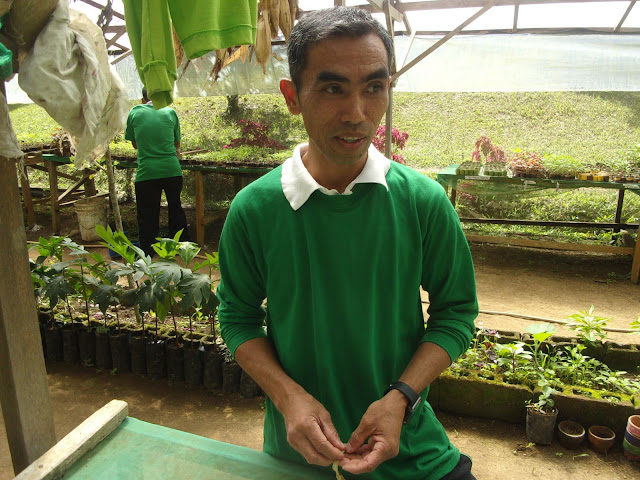 |
| Aerial view of the vegetable garden. Photo by Jabez Flores |
After spending a week in Visayas (Antique and Cebu), the team went to Silang, Cavite to visit an organic farm called Kai Farms. Hidden on top of the cool foggy mountains of Cavite, the farm is well-known to backyard gardeners and organic farming enthusiasts. By the way, the road going to the farm is quite challenging due to construction, we wouldn't suggest visiting on a rainy day! Upon our arrival, we were greeted by Thomas Caristea (or Kuya Thom), the farm's 'earth leader'--he supervises a team of around 13 farmers. He led us to his brother's house where we would stay for the next three days since the farm does not have accommodations...yet. After settling in, he brought us to the farm which was just a few minutes walk from the house.
 |
| Kuya Thom being interviewed. Photo by Jabez Flores |
Kuya Thom introduced us to the farmers and the two newly hired young agriculturists, Yancy and Camiel. It was only their third day in the farm. The group was offered some tea and we had a long chat in the gazebo before we started the tour.
 |
| Rolled 'saba' banana leaves to be used as seed packets. Photo by Jabez Flores |
During the tour, we noticed that the farmers were rolling leaves of bananas into small seedling containers. They told us that they no longer use plastic in the farm that's why they came up with the banana packets. After visiting ten permaculture sites, this was the first time we saw this being practiced.
The farm was a textbook example of a permaculture design--small and compact, integrated and stacked, and zoned clearly according to use and function. As for gathering data, it was challenging for us because so many things are planted in very tight spaces. Which is thrilling, actually.
 |
| Young agriculturists, Camiel and Yancy, rolling banana leaves. Photo by Jabez Flores |
On our last day, the owner, Karla Delgado, visited the farm to pick up vegetable deliveries together with her friends, Asha and Lourdes Villaraza. We had the chance to see how the vegetables were being packed using banana leaves. Then we all had a wonderful lunch together.
We would like to say thank you to Amena Bal for connecting us with Karla and Kuya Thom. We hope you would be at the farm next time! Thank you also to Karla, Kuya Thom, and the rest of the staff for accommodating us for three days.














































